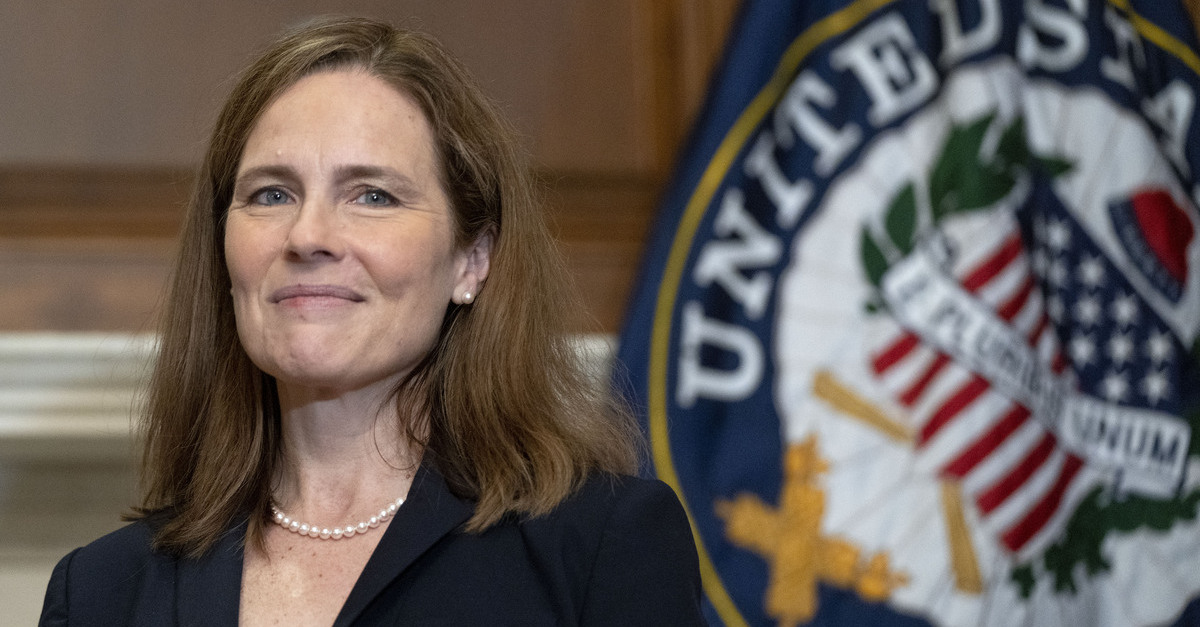
In the wee hours of Thanksgiving morning, Justice Amy Coney Barrett cast the deciding vote in the Supreme Court’s ruling against New York Governor Andrew Cuomo’s COVID-19 restrictions. Justice Barrett’s vote came as the expected 5-4 Court sided with the Catholic Diocese and two Orthodox Jewish synagogues, holding that the restrictions limiting religious services likely constituted a violation of the First Amendment.
SCOTUS’s ruling is a temporary one, granting the plaintiffs an injunction that temporarily halts Governor Cuomo’s executive order. The Court’s unsigned per curiam opinion called the plaintiffs’ need for relief “essential,” and noted that the religious groups bringing suit have a strong likelihood of success on the merits. SCOTUS agreed with plaintiffs that the COVID-19 restrictions “single out houses of worship for especially harsh treatment.”
The Court explained the facts underlying its decision, specifically referring to testimony given before the District Court by a health department official, who testified that “a large store in Brooklyn that could ‘literally have hundreds of people shopping there on any given day,’” while religious gatherings were limited to 10 or 25 people. The Court also distinguished the New York cases from other cases previously before it regarding other COVID-19 measures.
“[The New York Restrictions] are far more restrictive than any COVID–related regulations that have previously come before the Court, much tighter than those adopted by many other jurisdictions hard-hit by the pandemic, and far more severe than has been shown to be required to prevent the spread of the virus at the applicants’ services.”
The Court suggested that less restrictive measures could have been used to combat the pandemic, and even went so far as to suggest that a better rule might have been tied to the specific congregation in question.
The Court also detailed its reasoning that preventing religious observers from attending services constitutes irreparable harm. “While those who are shut out may in some instances be able to watch services on television,” states the unsigned opinion, “such remote viewing is not the same as personal attendance. Catholics who watch a Mass at home cannot receive communion, and there are important religious traditions in the Orthodox Jewish faith that require personal attendance.”
“Members of this Court are not public health experts,” the Court acknowledges, “and we should respect the judgment of those with special expertise and responsibility in this area.” It went on to say, “But even in a pandemic, the Constitution cannot be put away and forgotten.”
Justice Neil Gorsuch penned his own concurrence to the per curium order, saying, “Government is not free to disregard the First Amendment in times of crisis.” Justice Gorsuch took aim directly at Governor Cuomo, calling him out for inconsistent regulations.
“Governor has chosen to impose no capacity restrictions on certain businesses he considers ‘essential,'” commented Gorsuch, “And it turns out the businesses the Governor considers essential include hardware stores, acupuncturists, and liquor stores. Bicycle repair shops, certain signage companies, accountants, lawyers, and insurance agents are all essential too.”
Gorsuch went on:
“So, at least according to the Governor, it may be unsafe to go to church, but it is always fine to pick up another bottle of wine, shop for a new bike, or spend the afternoon exploring your distal points and meridians. Who knew public health would so perfectly align with secular convenience?”
“The only explanation for treating religious places differently,” slammed Gorsuch, “seems to be a judgment that what happens there just isn’t as ‘essential’ as what happens in secular spaces.”
“That,” concluded the justice, “is exactly the kind of discrimination the First Amendment forbids.”
Commenting on other states’ COVID-19 regulations, Gorsuch added,”Even if the Constitution has taken a holiday during this pandemic, it cannot become a sabbatical.”
Justice Brett Kavanaugh also added his thoughts in a separate concurrence. Noting that New York’s restrictions are tighter than those of other states, Kavanaugh said those rules “not only are severe, but also are discriminatory.”
Chief Justice John Roberts issued a dissenting opinion, which was narrowly focused on the timing of the Court’s order. Acknowledging that New York’s restrictions “do seem unduly restrictive,” Roberts pointed out that Governor Cuomo revised his restrictions to depart from a strict numerical limit on religious gatherings, and instead, allow a 50% capacity cap. Roberts suggested that if the stricter limit were re-imposed, that would be the appropriate time for the Court to enjoin the order.
Justice Stephen Breyer penned the more substantive dissent joined by Justices Sonia Sotomayor and Elena Kagan. The trio also agreed that the Court’s involvement at this point was premature, given that the plaintiffs in question are currently able to hold services. Breyer pointed out the extreme numbers of COVID-19 cases in New York and the science underlying heavier restrictions on gatherings like church services, during which individuals are in close proximity for an extended period of time.
The judiciary, wrote Breyer, should not be second-guessing other branches of government in this way. The justice wrote:
“The elected branches of state and national governments can marshal scientific expertise and craft specific policies in response to ‘changing facts on the ground.’ And they can do so more quickly than can courts. That is particularly true of a court, such as this Court, which does not conduct evidentiary hearings. It is true even more so where, as here, the need for action is immediate, the information likely limited, the making of exceptions difficult, and the disease-related circumstances rapidly changing.”
Sotomayor also dissented and said the Supreme Court’s conservatives were playing a “deadly game.”
“Justices of this Court play a deadly game in second-guessing the expert judgment of health officials about the environments in which a contagious virus, now infecting a million Americans each week, spreads most easily,” Sotomayor wrote.
Kagan joined that dissent.
[image via Leigh Vogel-Pool/Getty Images]